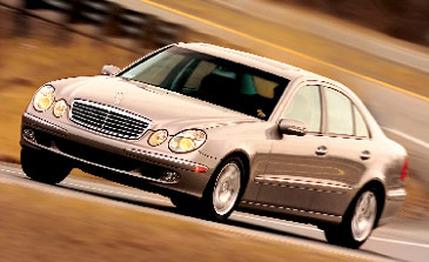
 Short Take Road Test
Short Take Road Test
On February 17, 1894, Rudolf Diesel persuaded his "rational heat engine" to run for more than a few fitful sputters, and the age of compression ignition-no spark required!-was born. You may wonder why. Couldn't Rudi afford spark plugs? Answer: Rudi had an idea for a more efficient internal-combustion engine.
At 10 feet tall, Diesel's first engine was just a little bulky for automotive applications. And by the time Mercedes bolted a diesel into one of its passenger cars, in 1936, Rudi was long gone to that great combustion chamber in the sky. But his creation lingers.
Fast forward to 2004. Mercedes-Benz introduces the 2005 E320 CDI, and the age of the Benz diesel is reestablished in North America, another example of the rebirth of compression ignition in the U.S. VW offers diesel options for the New Beetle, Jetta, Passat, and Touareg. Jeep is about to do the same with the Liberty. And now here's Mercedes back in the game after a five-year absence.
Given the increasingly hostile regulatory climate facing diesels, this may seem to be a dead-end business. Even with the 2006 onset of low-sulfur fuel and the huge improvements that go with common-rail fuel injection, there are Tier 2 emissions hurdles on the near horizon-oxides of nitrogen and particulates-that may be too tall for current diesels to clear. And in fact, the CDI's return to the U.S. is limited to 45 states. It's regulated out of California, New York, Maine, Massachusetts, and Vermont.
On the other hand, passenger-car diesels are more civilized than ever before, a conviction that emerged during our recent review of several sparkless rides ("Diesel's Last Stand?" March 2004) and was reinforced during our communion with a U.S.-spec E320 CDI, one of the first of some 4000 that Mercedes plans to sell this year, with prices starting at about $50,000. That's $1000 and change north of the base price for the gas-powered E320.
So what do you get for the CDI's price premium? More. And less. More mass, more thrust, and more fuel economy. Less of that irritating old diesel noise and stink.
The heart of the matter is a 3.2-liter DOHC 24-valve intercooled inline turbo-diesel six-cylinder engine. Like all diesels, the compression ratio is high-18:1-although not as high as naturally aspirated diesels. The turbocharger has a variable nozzle turbine, integrated with the engine-management system. Fuel-rail pressure is bottom-of-the-ocean prodigious-almost 23,000 psi, about 350 times the pressure in a gas E320-to promote optimal fuel atomization through the seven-hole nozzles of each injector valve, one of the keys to the improved combustion efficiency of common-rail diesels.
Another element distinguishing this diesel is a pilot-injection function that precedes the main combustion event by a few milliseconds, damping the noise, mitigating temperature changes, and reducing NOx emissions.
But that's not what diesel buyers care about. They care about diesel virtues: fuel economy and torque. The CDI's horsepower rating is modest-201 at 4200 rpm, 20 less than the gasoline engine-but its torque output puts the V-6 on the trailer: 369 pound-feet versus 232. And the peak occurs on a lovely plateau that begins barely off idle: 1800 to 2600 rpm.
What this means is weight-lifter muscle at relaxed engine speeds, which is a good thing. With its heavy-duty cast-iron engine block-a diesel trait that hasn't changed much over the years-plus extra sound damping, the E320 CDI weighs in at just over two tons, 219 pounds more than the gas E320 we tested last year ("The Magnificent Not-Quites," March 2003). Nevertheless, the diesel is quicker to 60 mph-7.1 seconds versus 7.4-and delivers more punch in low- and midrange sprints: 30 to 50 in 3.5 seconds, 50 to 70 in 4.8. The gas E320 recorded 3.8 and 5.4 seconds, respectively.
Fuel economy: The CDI is EPA-rated for 27 mpg city and 37 highway versus 19 and 27 for the gasoline car. Our own experience, accumulated in mostly urban driving of the no-prisoners variety, averaged just over 24 mpg. Still, with a 23.5-gallon fuel tank, the CDI's range potential-some 500 miles-clearly exceeds the capacity of most bladders. We were also surprised to see that diesel fuel was cheaper in our locale than gasoline.
Diesel clatter? Yes, it's still there-for about five minutes at startup, particularly on cold mornings. Beyond that, though, the CDI is generally quieter than its gasoline counterpart. Diesel stink? Not a hint.
The E320 CDI isn't remotely sporty. Its character is subdued and dignified, masking those deep reserves of power, thus making them even more gratifying when the driver calls them up. We bet Rudi would have loved it.